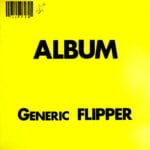ALBUM REVIEW: FLIPPER- Album- Generic Flipper
BEST TRACKS: Ever, Life is Cheap, Sex Bomb
It was on a 1983 Bay Area public access television performance that Flipper’s Will Shatter told his increasingly frustrated interviewer that Flipper wasn’t a punk band. Now, this could simply be relegated to the band being characteristically difficult; after all, they had spent the last hour in their shaved heads and ratty jeans screaming through a comically overdriven bass. They may have not literally been the Ramones, but sonically and rhetorically, Flipper fit well within the emerging West-Coast scene among Bay Area contemporaries like the Dead Kennedys or the Units and LA bands like X, Germs, and Black Flag. But Shatter’s prescription can’t fully be dismissed as a punk insistence on outsiderdom. Flipper was different. The core of punk rock insisted on a visceral release of frustration, a direct line from a performing band to its audience and, on a larger scale, the entire surrounding society they were so disillusioned with. With an insistence on such caustic expulsions, simplicity is required. Any ornamentation would impede the central thesis behind the music’s very insistence, and therefore, punk’s simplicity is indirect. Flipper, however, made this simplicity the main tenant of their musical philosophy. Rather than a necessity placed to prevent collapse under the weight of anger, they distilled and subverted music itself into their own warped, inflamed expression. Flipper wasn’t a punk band, it was a deconstruction band.
Flipper was born out of 1979’s San Francisco to parents Ricky Williams, Ted Falconi, Steve DePace and Will Shatter. Falconi, a Vietnam vet, distinguished himself as a guitar player through his insanely distorted, mid-heavy, disgustingly compressed tone while Shatter’s bass was almost equally as overdriven while relishing in the uncomfortably trebly territory. Williams was replaced by Bruce Loose before the band could record anything, and both Loose and Shatter switched between bass and vocal duties. After releasing a handful of singles (most notably Sex Bomb, an eight-minute sludge of Shatter screaming “She’s my sexy bomb, yeah” over and over) Flipper came out with their debut full length, Generic Flipper, on San Fran’s Subterranean Records in 1982. It was slow; it was sardonic; it was annoying. Today, it remains Flipper’s most recognizable and fully representative work, melding Black Sabbath’s distorted doom into the Sex Pistol’s irreverence and debauchery. Caught in between the two distinct phases of punk which respectively emphasized excess and self-discipline, Flipper existed as a band without a country. The band took no issue with excessive drug use (Shatter died in 1987 of a heroin overdose), yet didn’t romanticize their self-destruction. They were a crusty group playing crusty music that made even the crustiest fans squeamish and irritable.
In a time where punk was getting faster, angrier, more confrontational, Flipper insisted on slowing down and laughing at the crushing weight of the world rather than trying to move it by force. In Generic Flipper’s opening track, “Ever”, Bruce Loose belts out mind-numbingly basic, yet frighteningly resigned lyrics such as “Ever live a life that’s real/Full of zest, but no appeal, Ever want to cry so much/ You want to die”. The bass and guitar are both distorted to oblivion, melting into one syrupy entity and trudging the song along at a tempo that is frustratingly slow. Do-wop claps are placed behind the horribly mixed drum kit, all culminating in a song mocking every single person who has ever expressed any sort of happiness at any point in their lives. And the rest of the album continues in this exact same vein. Shatter and Loose take turns being obnoxiously sarcastic, yet it’s hard to believe that the defeat that they so adamantly preach isn’t at least a partially lived-experience. “Life is Cheap” begins with a doom metal riff played with Falconi’s ridiculously cheap sounding tone, and the drums (which sound like they were recorded by a teenager in a laundry room) begin about 15 seconds in to lock the 4-minute long song in a seemingly unending groove. And Sex Bomb makes another appearance. The eight-minute fart of a song features Shatter screaming at the top of his lungs while his typical sludge infested backing is supplemented by a saxophone of all things. It’s as if Flipper dressed up like the Rolling Stones only to pull down their pants and shit directly on the stage.
By the early 80s, punk was getting faster, angrier, more macho, obsessed with self-discipline and abrasively bettering the world. But Flipper was decidedly not that. As the Black Flag’s sped up to explore the capabilities of what punk could mean, Flipper insisted on slowing it down, making it increasingly unpleasant and wholly nihilistic. They were hated and probably rightfully so. However, whether intentional or not, Flipper was responsible for generations of noise and sludge expressions which defined American post-punk alternativism. Generic Flipper was a brutally simple collection of noise paired with often juvenile pessimism. It can kind of be looked at like the piece of modern art that’s just a white canvas. You could have done it, but you didn’t.
-Cliff Jenkins

